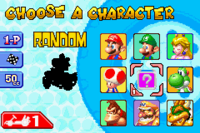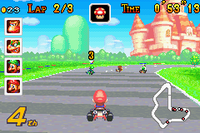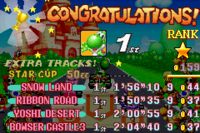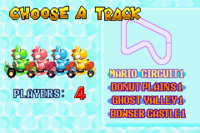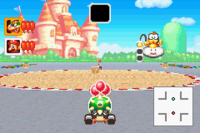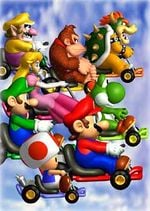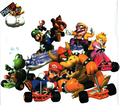Mario Kart: Super Circuit
| Mario Kart: Super Circuit | |||||||
|---|---|---|---|---|---|---|---|
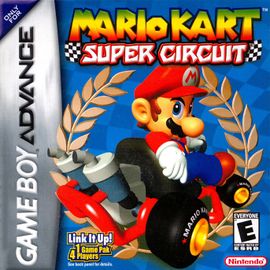 For alternate box art, see the game's gallery. | |||||||
| Developer | Intelligent Systems | ||||||
| Publisher | Nintendo | ||||||
| Platform(s) | Game Boy Advance, Virtual Console (Nintendo 3DS, Wii U) | ||||||
| Release date | Game Boy Advance: Template:ReleaseVirtual Console (3DS) (Ambassador Program): Template:ReleaseVirtual Console (Wii U): Template:Release | ||||||
| Genre | Racing | ||||||
| Rating(s) |
| ||||||
| Mode(s) | Single-player, multiplayer | ||||||
| Input | Wii U: Game Boy Advance: Nintendo 3DS:
| ||||||
Mario Kart: Super Circuit is a Mario Kart game for the Game Boy Advance. It is the third entry in the series and the first one to be released for a handheld console. Mario Kart: Super Circuit was first released on July 21, 2001 in Japan. The game combines the elements from the previous Mario Kart games, with the key feature of the Mario Kart series being the usage of items obtained from Item Boxes in order for the operator to gain an advantage over the opponents being retained; additionally, it contains all the courses from Super Mario Kart. Mario Kart: Super Circuit allows up to four players to enjoy the game through the Game Link Cable, including a multiplayer mode where only one game cartridge is needed; however, the single cartridge-based multiplayer has heavy restrictions on the content available.
Mario Kart: Super Circuit was eventually re-released on the Nintendo 3DS's Virtual Console exclusively to the 3DS Ambassadors first in Oceania on December 15, 2011. Mario Kart: Super Circuit was re-released again on the Wii U's Virtual Console in North America first on November 13, 2014. Mario Kart: Super Circuit is the only Mario Kart title to be developed by Intelligent Systems, as well as the last Mario Kart game where the drivers are sprites rather than models. This is one of the latest entries in the Mario franchise to use the N64-era art direction (which had been in place since Super Mario 64 in 1996), as Nintendo updated the 3D art direction after 2001.
Gameplay
The objective in this game is to place first in the races, as with most racing games. Each race has eight drivers. As in other Mario Kart games, players can drive through Item Boxes which contain items, which can aid the players. On the course, coins are collected to increase the kart's top speed. Like with Super Mario Kart, if the player has no coins, they spin out if they collide with another racer. The player starts a race with 2 to 5 coins depending on the starting position, and 50 coins are found on each course. Therefore, the player can hold up to 55 coins at once.
This game has five cups, and each has four new race courses. These cups are the Mushroom Cup, the Flower Cup, the all new Lightning Cup, the Star Cup, and the Special Cup. If players collect 100 coins in each cups after winning Special Cup for the engine class, they unlock the Extra Cup version. These cups contain all of the courses from Super Mario Kart. If the player manages to collect a gold trophy on all of the Super Circuit cups, the background for the title screen changes to a sunset. If the player manages to obtain a triple star ranking for all Super Circuit cups, the title screen's background changes to a night time setting. In addition to the aesthetic changes, the intro's theme also changes.
Controls
Menu controls
| Action(s) | ||||
|---|---|---|---|---|
| Game Boy Advance | Nintendo 3DS | Wii U GamePad Wii U Pro Controller Wii Classic Controller |
Wii Remote | |
| Select | ||||
| Confirm | ||||
| Cancel | ||||
| Access options for certain modes |
Game controls
| Action(s) | ||||
|---|---|---|---|---|
| Game Boy Advance | Nintendo 3DS | Wii U GamePad Wii U Pro Controller Wii Classic Controller |
Wii Remote | |
| Steer left or right | ||||
| Accelerate / Rocket Start (Start of race) | ||||
| Brake | ||||
| Hop and Power Slide | ||||
| Use Items, stop Item Roulette | ||||
| Go in reverse | ||||
| Shoot Item in certain direction | ||||
| Quick sharp turn left or right | ||||
| Pause game | ||||
| Horn |
- On the character selection screen, if the player presses the
 ,
, ,
 or
or  button, the character the player is on fires a green shell. If the player presses
button, the character the player is on fires a green shell. If the player presses  ,
, ,
 , or
, or  button, the character hops. If the player presses
button, the character hops. If the player presses ,
or
 button, the characters honk their horn. However, the horn does not work if Random is selected.
button, the characters honk their horn. However, the horn does not work if Random is selected.
Game modes
Mario Kart: Super Circuit has five different game modes: Grand Prix, Time Trial, Quick Run, VS, and Battle Mode. All are accessed by the single player except VS and battle modes. Up to four players can participate using the Game Boy Advance Link cable with even a single game cartridge. However, all players using single cartridge mode are limited to selecting Extra Mushroom Cup using only Yoshi and different colors of him.
Grand Prix
In this mode, one or two players race against the CPU. The player chooses a cup and plays the four courses it contains. The player earns points by placing within the first four positions. When finished in fifth place or lower, the player must restart the race. The player is able to restart a race three times, with three race flags representing the lives. When the flags run out, the player can no longer restart any race in the cup, and must start from the first race if they fail to reach 4th or higher. When playing with two players, only one player has to finish in the top four in order to move on to the next race. At the end of the cup, the player with the most points wins. There are three different speeds to choose from, each with varying difficulty.
- 50cc - This engine size is the smallest engine size. Karts go at a slower pace than other engine sizes. Computers rarely use items against the player. This engine size is best suited for beginners.
- 100cc - A slightly larger engine size. Karts go slightly faster than 50cc, but not as fast as 150cc. Computers use items more often against the player. This engine size is better suited for intermediate players.
- 150cc - The largest engine size. Karts go at their fastest. The computer regularly uses items against the player, such as frequently throwing Red Shells, using Boos, or even tossing a Spiny Shell. This engine size is best suited for expert players.
Ranking
Depending on a player's performance in GP, the player can achieve one of the following eight ranks:
- ⭐⭐⭐: The player must score first consistently in the GP races and has fulfilled the requirements as stated below.
- ⭐⭐
- ⭐
- A: The player has collected all 36 points.
- B: The player has collected at least 30 points.
- C: The player has collected at least 25 points.
- D: The player has collected at least 20 points.
- E: The player has not fulfilled the above stated requirements.
Several factors account for a hidden score, which then translates to a rank.[1]
- The more coins collected, the higher the score.
- The player's time on each lap. Points are awarded depending on the time and are never deducted.
- The more times and longer players hit the brakes, the lower their score. This does not count if players brake to avoid a slip from a Banana Peel.
- The more times and longer players let go of the acceleration button, the lower their score.
- Using Triple Red Shells, Stars, and Lightning Bolts decreases the score, with the Star decreasing the score the most.
- If Lakitu must pick up the player, the score is lowered. Initiating the mini-turbo at the correct time will negate it somewhat, however.
- The more times players hit enemy racers or obstacles, their score is lowered. Hitting walls slightly decreases the score more.
- Getting hit by items lowers their score, except for Lightnings, which increase the score.
- The more retries used, the lower their score.
- The more time the player spends outside the track, the lower their score.
- Starting the race with a boost increases the score.
- Initiating more drift mini-turbos increases the score.
- Passing an item box while already having an item (but not deployed yet) increases the score.
- Picking certain characters can also affect the score, giving bonus points. This is because some have less grip on the road than others, so the game rewards characters with the least grip the most points.
- Bowser (45 points)
- Wario (40 points)
- Donkey Kong (40 points)
- Mario (30 points)
- Luigi (30 points)
- Princess Peach (10 points)
- Toad (10 points)
- Yoshi (0 points)
Time Trial
One player can race against the best times on each course with no CPU opponents. After beating a best time, players can save Ghost data onto each time trial course. Whenever the player races on that course again, the player's Ghost mirrors movements of the saved data. Ghost data can also be downloaded from other players using the Game Boy Link Cable. Players are given Triple Mushrooms for use during Time Trials. Players also have the option to view their Ghost data using the Records option. Players can either turn their Ghost on or off during Time Trials using the before selecting the mode.
Quick Run
Quick Run is a one player VS mode, unique to Mario Kart: Super Circuit, that enables players to race on any tracks they unlocked with no restrictions or regulations. Players can choose what engine size they want to race on, with the difficulty level alongside with the speed. Players can alter the number of laps, appearance of coins, and item boxes by pressing before accessing this mode. Later Mario Kart installments since Mario Kart DS (excluding Mario Kart 7) have a similar mode to Quick Run, which is named VS mode except that single players can also access the mode.
VS
VS mode is basically a Quick Run mode with two to four players. This mode cannot be accessed by only one player. CPU players are turned off in this mode. The game counts how many times the player won or lost against other players. Players can alter the number of laps, appearance of coins, having triple mushrooms as starting items[2] and item boxes by pressing before accessing this mode, but only if you play with multiple game cartridges. Players can play with multiple game cartridges or just a single cartridge via Game Boy Link Cable. When using a single cartridge, however, players are limited to their choices. Players will use a different colored Yoshi. Player 1 will be Green, player 2 Red, player 3 Light Blue, and player 4 Yellow. Aside from that, the only courses available are four SNES courses: Mario Circuit 1, Donut Plains 1, Ghost Valley 1, and Bowser Castle 1.
Battle
Just like VS mode, Battle mode cannot be played with only one player. The player participates with one to three other players in attempt to pop each other balloons using items. Also seen in VS mode, the game counts how many times the players won or lost. When a player loses all of their balloons, the player turns into a Bob-omb and stays like that for the rest of the game. The Bob-omb can make it more difficult for the other players by either picking up item boxes or blasting into their karts.
Characters
All playable characters from Mario Kart 64 return, along with colored Yoshis appearing only in the multiplayer mode. As in all the previous games, they also race in the same go-karts, but with different sizes and colors that suit each playable character. Also, as in all the previous games, each racer is classified into three categories: lightweight, middleweight, and heavyweight, each class with their own advantages and disadvantages. Additionally, in VS play with a single cartridge, all players use Yoshi, with each being a different color.
Many other characters appear in the game as nonplayable. Some can help out, such as Lakitu, who can pull characters out of the water, and Boo, who serves as an item. Other characters are mainly there to serve as obstacles to racers, and many hinder the racers by making them spin out.
Drivers
Characters are divided into three classes depending on their weight: Light, Medium, and Heavy. Characters' speed and weight stats are viewable at the player select screen.
Lightweights are generally characterized by having high acceleration and low top speed. They are knocked easier by heavyweights and middleweights and skid easier. Peach and Toad share the same stats as having the highest acceleration and handling, and the least weight and top speed in the game, and Yoshi offers slightly less acceleration and handling for slightly better weight and speed.
Middleweights are classified by their all-around stats. They do not excel at anything, nor do they have any significantly low stats. The only middleweights are Mario and Luigi, and they share the same stats.
Heavyweights have a very high weight and top speed stat, but suffer from low acceleration. They also skid less than karts of lighter weight. Bowser offers the most weight and top speed in the game, but the worst acceleration and handling while Wario and Donkey Kong have slightly worse weight and speed in exchange for slightly higher handling and acceleration.
The character selection screen offers the option to select a random character if the Item Box icon is selected.
| Artwork | Driver | Stats | Weight class |
|---|---|---|---|
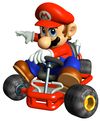
|
Middleweight | ||

|
Middleweight | ||

|
Lightweight | ||
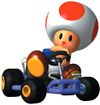
|
Lightweight | ||
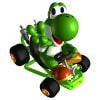
|
Lightweight | ||
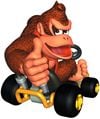
|

|
Heavyweight | |

|
Heavyweight | ||
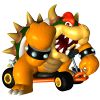
|
Heavyweight |
A few Yoshi color variants are only playable in Single-Pak Multiplayer, each by a certain player.
| Sprite | Driver | Stats | Weight class |
|---|---|---|---|

|
Red Yoshi (Player 2) | Lightweight | |

|
Light Blue Yoshi (Player 3) | Lightweight | |

|
Yellow Yoshi (Player 4) | Lightweight |
Rival order
Similar to Super Mario Kart, a preset order of CPU opponents from slowest to fastest exists for each character in Grand Prix mode. In Quick Run mode, the orders are reversed, except in the first track of each cup. When playing Grand Prix in multiplayer, the rival order depends on the first player's character.
| Player | Fastest CPU | 2nd-fastest | 3rd-fastest | 4th-fastest | 3rd-slowest | 2nd-slowest | Slowest CPU |
|---|---|---|---|---|---|---|---|
| Mario | Donkey Kong | Bowser | Luigi | Yoshi | Peach | Toad | Wario |
| Luigi | Wario | Toad | Yoshi | Mario | Peach | Donkey Kong | Bowser |
| Peach | Luigi | Bowser | Donkey Kong | Yoshi | Mario | Toad | Wario |
| Toad | Peach | Luigi | Yoshi | Mario | Wario | Donkey Kong | Bowser |
| Yoshi | Peach | Luigi | Toad | Mario | Wario | Donkey Kong | Bowser |
| Donkey Kong | Yoshi | Bowser | Toad | Luigi | Peach | Mario | Wario |
| Wario | Bowser | Donkey Kong | Yoshi | Mario | Luigi | Peach | Toad |
| Bowser | Donkey Kong | Peach | Mario | Yoshi | Toad | Luigi | Wario |
Non-playable
Items
Mario Kart: Super Circuit features eleven of the fourteen items from Mario Kart 64, with no new additions, also making this and Mario Kart Live: Home Circuit the only Mario Kart games to not introduce any items. Like the past games, items are found in Item Boxes and are typically used to hinder opponents and assist players who obtain them.
| Sprite | Item | Description |
|---|---|---|

|
Mushroom | Obtained commonly by any-ranked drivers, using it grants the driver a great burst of speed within a moment. They can be used to go off-road more easily, and fly further after going over a ramp. They can also be used to bump drivers out of the way; those with no Coins will spin out instead. |

|
Triple Mushrooms | Obtained exclusively in Time Trial and Versus modes. Drivers will have three Mushrooms instead of one. They cannot be replenished once they are all used until the Time Trial is over. |

|
Banana | Obtained commonly by high-ranked drivers, they can be held on the back or thrown forward or dropped behind. They act as obstacles; drivers running over them will spin. The effect can nullified if the driver brakes upon running over it; success of the action is indicated by a music note symbol coming out from the driver. Any type of Shell or Star effects can destroy them. |

|
Green Shell | Obtained commonly by high-ranked drivers, they can be held on the back or thrown forward or backward. Once thrown, they can bounce off walls multiple times before breaking; drivers hit by this will spin. Bananas, any type of Shells, or Star effects can destroy them. |

|
Triple Green Shells | Obtained uncommonly by higher-ranked drivers, three Green Shells revolve around the driver, shielding from most attacks. They act like Green Shells, but cannot be thrown backward. |

|
Red Shell | Obtained uncommonly by any-ranked drivers, they can be held on the back or thrown forward or backward. If thrown forward, it will target the next high-ranked driver. If not, it will shoot straight instead and break upon hitting a single wall. If thrown backwards, they stay in a fixed position; if a driver goes near one, it will target them regardless of ranking. Bananas, any type of Shells, or Star effects can destroy them. |

|
Triple Red Shells | Obtained uncommonly by lower-ranked drivers, three Red Shells revolve around the driver, shielding from most attacks. They act like Red Shells, but cannot be thrown backward in a fixed position to target a driver regardless of ranking. |

|
Spiny Shell | Obtained rarely by low-ranked drivers, with rarity determined by engine class, they can be held on the back or thrown forward or backward. It makes a continuously loud noise when used. If thrown forward, it will follow the track and targets the first-place driver; subsequent drivers caught in the path will spin out. If thrown backward, they stay in a fixed position to target the first-place driver passing by. Colliding with a wall or a ramp, falling into a pit or water, or hitting a driver with the star in effect can destroy them. |

|
Boo | Obtained uncommonly by any-ranked drivers, they steal an item from a random driver if available, attacks the first-place driver, and grants invisibility for a moment. The driver is immune to all obstacles and items, and can pass through drivers without bumping, but it doesn't prevent them from losing speed off-road. |

|
Star | Obtained rarely by low-ranked drivers, they grant invincibility and increase their top speed, acceleration, and handling for a moment. Bumping a driver under this effect will spin them out. They are also used to go off-road without losing any speed and can destroy stage obstacles. |

|
Lightning | Obtained rarely by lower-ranked drivers, they shrink every other driver not using a Star or a Boo. Shrunk drivers lose speed and the ability to use Mushroom. Shrunk drivers run over by a normal driver will spin out. Shrunk drivers revert back to normal after a set amount of time or if they go into a pit. |
Courses
The game features 20 new courses, and brings back the original 20 courses of Super Mario Kart (though, due to the Grand Prix format, they are organized in five cups instead of four). However, most courses brought back have the hazards removed found in them such as the Monty Moles in the Donut Plains, oil slicks in the Mario Circuits, and the Thwomps in Bowser Castles and Rainbow Road. The only hazards that have stayed are the breakable blocks in the Ghost Valley and Vanilla Lake, as well as water holes in Koopa Beach. The cups containing Super Mario Kart courses are unlocked for usage in Grand Prix Mode by finishing the respective engine class' Special Cup consisting of Mario Kart: Super Circuit tracks in first place, and then completing each cups again, while collecting at least 100 coins.
Mario Kart: Super Circuit has the most Bowser Castles (four from this game's tracks and three from the original's tracks, making seven total tracks) in any Mario Kart game to date.
Super Circuit tracks
Extra tracks
These courses were originally featured in Super Mario Kart, and are reused in Mario Kart: Super Circuit. The player races five laps on these tracks in Grand Prix mode. These courses lack some of the obstacles from Super Mario Kart. Coin locations are also changed so that each track has exactly 50 coins. Mario Kart DS and onward would later have a very similar feature called Retro Grand Prix, which features four cups consisting of tracks from all the past Mario Kart games.
| Extra Mushroom Cup |
 Mario Circuit 1 |
 Donut Plains 1 |
 Ghost Valley 1 |
 Bowser Castle 1 |
|---|---|---|---|---|
| Extra Flower Cup |
 Mario Circuit 2 |
 Choco Island 1 |
 Ghost Valley 2 |
 Donut Plains 2 |
| Extra Lightning Cup |
 Bowser Castle 2 |
 Mario Circuit 3 |
 Koopa Beach 1 |
 Choco Island 2 |
| Extra Star Cup |
 Vanilla Lake 1 |
 Bowser Castle 3 |
 Mario Circuit 4 |
 Donut Plains 3 |
| Extra Special Cup |
 Koopa Beach 2 |
 Ghost Valley 3 |
 Vanilla Lake 2 |
 Rainbow Road |
Battle courses
Four new battle courses appear in the game. No battle courses from the previous Mario Kart games return; however, all four of the courses from Super Mario Kart exist in the game's code and are playable through hacking.
Reception
Critical reception
Mario Kart: Super Circuit received critical acclaim. It scored an average of 91.54% based on 39 reviews in GameRankings and an average of 93 based on 24 reviews in Metacritic.[3][4]
Craig Harris of IGN praised nearly all of the game's aspects and noted that the extra development time of the game can make it outstanding. He ended with, "It's a GBA game with very few flaws -- it's a shame that it didn't quite make the system launch, but the extra wait did the game wonders, and it shouldn't be missed." He gave the game a 9.5 out of 10.[5] Tom Bramwell of Eurogamer gave the game a 9 out of 10. Though he criticized the lack of backlighting due to the Game Boy Advance system lacking it and the pick-up system of Lakitu, he praised the game for being a vast, improved "conversion" of Super Mario Kart onto the Game Boy Advance. He wrote, "It has everything a single player, or indeed a foursome of like-minded console gamers, could ever dream of, and all with the added benefit of extensive replayability. With Super Mario Advance 2 still a way off, Mario Kart Super Circuit is the killer app for GameBoy Advance as of now. Buy it."[6] Joao Diniz Sanches of Pocket Gamer UK gave the game a 9 out of 10. He praised the game for being universally and immediately fun.[7]
Ron DelVillano of Nintendo Life reviewed the ambassador version of Mario Kart: Super Circuit and gave the game a 7 out of 10. Though he noted the game's aging and that the multiplayer is removed in the 3DS Ambassador version, he called the game fun and worthwhile to play with.[8]
| Reviews | |||
|---|---|---|---|
| Release | Reviewer, Publication | Score | Comment |
| Game Boy Advance | Craig Harris, IGN | 9.5/10 | "Mario Kart Super Circuit is a perfect example of how a little extra development time can do a Game Boy Advance title wonders." |
| Game Boy Advance | Tom Bramwell, Eurogamer | 9/10 | "Mario Kart Super Circuit is the killer app for GameBoy Advance as of now. Buy it." |
| Game Boy Advance | Joao Diniz Sanches, Pocket Gamer UK | 9/10 | "There is obviously scope for bettering your skills both as driver and combatant, and the sense of achievement from outplaying the competition is immense, but ultimately Super Circuit's greatest achievement has to be how immediately and universally the game's exceptional thrills can be enjoyed." |
| Nintendo 3DS | Ron DelVillano, Nintendo Life | 7/10 | "It may not have aged as well as some other classic games, Mario Kart: Super Circuit is still a good time and provides hours of kart racing action to anyone looking for it." |
| Game Boy Advance | Amer Ajami, GameSpot | 8.2/10 | "Whether you're an ardent fan of the Mario Kart series or a first-time player, Mario Kart Super Circuit is a must-have for owners of the Game Boy Advance." |
| Game Boy Advance | Mark Brown, Cubed3 | 9/10 | "Some may try to tell you otherwise, but this is the definitive version of Mario Kart, and a perfect way to warm up your karting skills in the run-up to the GameCube's forthcoming release. Thoroughly recommended." |
| Aggregators | |||
| Compiler | Platform / Score | ||
| Metacritic | 93 | ||
| GameRankings | 91.54% | ||
Sales
Mario Kart: Super Circuit is the fourth best-selling game for the Game Boy Advance after Pokémon Ruby, Sapphire, FireRed, LeafGreen, and Emerald, selling 5.91 million copies worldwide, as of March 31, 2009.
Pre-release and unused content
Early Nintendo Power screenshots showed that the characters had different, "super-deformed" sprites of bigger heads contrasted by smaller karts. The game was planned to feature all 14 of the Mario Kart 64 items, but the Banana Bunch, Super Mushroom, and Fake Item Box were removed for unknown reasons. The unfinished versions can be seen by using a GameShark code: the Banana Bunch is non-functional, the Super Mushroom acts like normal, and the Fake Item Box causes racers to spin out of control as with a Banana. There is also an infinite version of the Super Mushroom.
Staff
- Main article: List of Mario Kart: Super Circuit staff
Mario Kart: Super Circuit was developed by Intelligent Systems, the same company behind the Paper Mario series and the WarioWare series. Takeshi Ando and Yukio Morimoto directed the game while the executive producer was Hiroshi Yamauchi. The Donkey Kong 3D model used in the pre-rendered sprites was provided by Rare Ltd..
Glitches
CPU Glitch
To perform this glitch, the player must select the Rainbow Road track with any character in 100cc or 150cc. When the race starts, the player must obtain a banana. At the shortcut area, the player must place the banana on the very corner of the curb leading to the shortcut. After that, the player must drive backward until the player is between the shortcut and the other side, then park on the middle of the track. If a CPU hits the player, the CPU may hit the banana and fall off. When the CPU is put back on track, it will drive toward the shortcut but still falling.[9]
Koopa Beach 1 Glitch Shortcut
If the player spindrifts after the finish line then aims behind it correctly, that player can perform a glitch were it could count as a lap if they shroomed behind the finish line with a hop.[10]
Cheese Land Glitch Shortcut
If the player spindrifts 270 degrees right going behind the starting line, that player could perform a glitch where the player can use a mushroom and a hop onto Little Mouser to count all three laps if successful. This will work with any character.[11]
Gallery
- Main article: Gallery:Mario Kart: Super Circuit
- Mario vs Bowser MKSC.jpg
Mario and Bowser
Lakitu and the playable characters
Wario and Toad racing on Yoshi Desert.
Donkey Kong, Toad, and Mario racing on Shy Guy Beach.
Media
- For a complete list of media for this subject, see List of Mario Kart: Super Circuit media.
| File info 0:30 |
| File info 0:30 |
| File info 0:18 |
| File info 1:26 |
References to other games
- Super Mario Kart: All previous race courses return with the hazards removed. Coins return in Mario Kart: Super Circuit with the same use as in this game, though without the Coin item. Part of the music used for Boo Lake/Broken Pier and the Mario Kart: Super Circuit Rainbow Road is a remix of the music from the Ghost Valley and Rainbow Road courses.
- Super Mario 64: The theme for the Bowser Castle courses has a similar bassline to that of the Bowser battle theme in this game.
- Mario Kart 64: Many sprites and artwork in this game are based off the sprites in this game, such as the karts, characters, and the character selection screen portraits. Most of the items from this game also return. Players who lose in battle mode in Mario Kart: Super Circuit also turn into Bob-ombs, similar to turning into Mini Bomb Karts. The selection of playable characters is exactly the same as in this game. Also, most voice clips (with the notable exception of Yoshi's) are reused from this game, specifically the Japanese version; Luigi, Peach, Wario, Toad, and the system voice's clips were not replaced with their Western versions when the game was localized for overseas release. Part of the music for Snow Land samples part of the music for Choco Mountain.
- Yoshi's Story: Shy Guy Beach is based on the level Shy Guy's Ship from this game. Some of Yoshi's voice clips are reused.
- Paper Mario: Bowser's Castle is in the background of Rainbow Road. The Hammer Bro seen during the awards ceremony has the same appearance as in this game.
References in later games
- Mario Power Tennis: Lightning Cup returns as part of the Gimmick Masters section of this game's tournament mode. However, the said cup goes by the name "Thunder Cup" in that game's English or Japanese version, as the Lightning Cup has been usually called the Thunder Cup in Japanese sources and not English ones.
- Mario Kart DS: This game uses the ranking system of Mario Kart: Super Circuit. Also, four GBA tracks return in this game: Peach Circuit, Bowser Castle 2, Luigi Circuit, and Sky Garden. The Lightning Cup has been traditionally modified as one of the four retro cups, and Sky Garden appears in the Lightning Cup in both of the games, a first and only time for the series. The Quick Run concept has been reused and renamed as Vs. Mode. The idea of returning older courses originates from Mario Kart: Super Circuit.
- Mario Kart Wii: Shy Guy Beach, Bowser Castle 3, and Battle Course 3 return in this game.
- Mario Kart 7: Bowser Castle 1 and Battle Course 1 return in this game.
- Super Smash Bros. for Nintendo 3DS / Wii U: One of the songs is a medley of the Rainbow Road themes from Mario Kart: Super Circuit, Mario Kart DS, and Mario Kart 7.
- Mario Kart 8 / Mario Kart 8 Deluxe: Mario Circuit returns as a retro course in this game and now features anti-gravity on the U-shaped section that has been inclined. Cheese Land and Ribbon Road return in Mario Kart 8 as retro courses in the second DLC pack, and come standard in Mario Kart 8 Deluxe. Sky Garden is also included among the courses in the Booster Course Pass for Mario Kart 8 Deluxe.
- Mario Kart Tour: Bowser Castle 1, Bowser Castle 2, Sky Garden, Cheep-Cheep Island, and Sunset Wilds appear as returning courses.
Names in other languages
| Language | Name | Meaning | Notes |
|---|---|---|---|
| Japanese | マリオカートアドバンス[?] Mario Kāto Adobansu |
Mario Kart Advance This is the only Mario Kart game where the English and Japanese titles differ. |
|
| Chinese (simplified) | 马力欧卡丁车 超级赛道[12] Mǎlì'ōu Kǎdīngchē Chāojí Sàidào |
Mario Kart: Super Circuit | |
| Chinese (traditional) | 瑪利歐賽車 Advance[13] Mǎlì'ōu Sàichē Advance |
Mario Kart Advance |
Trivia
- In Japan, it was once possible to challenge other players online by connecting their GBA to a compatible mobile phone via the Mobile Adapter GB. Players could upload personal records, browse national rankings, and participate in Time Trial-based tournaments with real world prizes as well.[14] This service ended in December 2002.
- This game was going to make use of the e-Reader at one point according to the European website for the game, however the section of the site intended to provide details on the e-Cards has nothing more than a "Coming Soon" notice.[15][dead link]
- This game was planned to release in mainland China by iQue, but left unreleased due to the huge scene of piracy in China at that time. The unreleased Chinese prototype received an ISBN, meaning it was approved for distribution despite the ban on video games from Chinese government.
- In multiplayer, Player 4's player color is pink in the menus, but is blue in-game.
References
- ^ http://www.gamefaqs.com/gba/371318-mario-kart-super-circuit/faqs/67255
- ^ [1]
- ^ GameRankings score of Mario Kart: Super Circuit GameRankings.
- ^ Metacritic score of Mario Kart: Super Circuit. Metacritic.
- ^ Harris, Craig. (August 29, 2001) Mario Kart: Super Circuit review IGN.
- ^ Bramwell, Tom. (September 27, 2001) Mario Kart: Super Circuit review. Eurogamer.
- ^ Sanches, Joao Diniz (October 21, 2005) Mario Kart: Super Circuit review. Pocket Gamer UK.
- ^ DelVillano, Ron (December 22, 2011) Mario Kart: Super Circuit review. Nintendo Life.
- ^ [2]
- ^ [3]
- ^ [4]
- ^ From the unreleased iQue version.
- ^ Official Chinese website for the Super Mario Bros. 35th Anniversary. Retrieved October 23, 2020.
- ^ https://web.archive.org/web/20021215133335/http://www.nintendo.co.jp/n07/contents/mc_amkj/index.html
- ^ Mario Kart: Super Circuit - European Gamesite
External links
- Japanese website
- European (UK) microsite
- Japanese commercial
- American commercial (full)
- American commercial (extended)
- American commercial (short)
